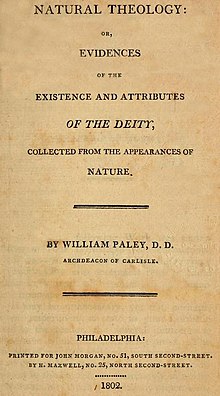William Paleyn kuuluisan Natural Theology sijasta haastajani korostaa muita teoksia, etenkin Principles, merkitystä hänen ajattelunsa ja teologiansa ymmärtämiseksi.
Mutta... esimerkiksi wikipedia tietosanakirja profiloi miehen nimenomaan Natural Theology teoksen mukaan
William Paley (July 1743 – 25 May 1805) was an English clergyman, Christian apologist, philosopher, and utilitarian. He is best known for his natural theology exposition of the teleological argument for the existence of God in his work Natural Theology: or, Evidences of the Existence and Attributes of the Deity, which made use of the watchmaker analogy.
Tärkeä Great Watchmaker analogia puolestaan määritellään nimenomaan Paleyn Natural Theology teoksen avulla. Argumentin ydin on
- The complex inner workings of a watch necessitate an intelligent designer.
- As with a watch, the complexity of X (a particular organ or organism, the structure of the solar system, life, the universe, anything complex) necessitates a designer.
In crossing a heath, suppose I pitched my foot against a stone, and were asked how the stone came to be there; I might possibly answer, that, for anything I knew to the contrary, it had lain there forever: nor would it perhaps be very easy to show the absurdity of this answer.
But suppose I had found a watch upon the ground, and it should be inquired how the watch happened to be in that place; I should hardly think of the answer I had before given, that for anything I knew, the watch might have always been there. ...There must have existed, at some time, and at some place or other, an artificer or artificers, who formed [the watch] for the purpose which we find it actually to answer; who comprehended its construction, and designed its use. ...Every indication of contrivance, every manifestation of design, which existed in the watch, exists in the works of nature; with the difference, on the side of nature, of being greater or more, and that in a degree which exceeds all computation.
William Paley, Natural Theology (1802)
__________
Perustellusti joku voi tähän sanoa, että mikä on wikipedia? (Itse teen suuren eron englantilaisen ja suomalaisen version välillä, jälkimmäistä en juuri käytä.)
Lyhyessä johdannossaankuvaa maineikas Encyclopaedia Britannica kuvaa hänen tuotantoaan tasapuolisesti, mutta korostaa sekin Natural Theology teoksen merkitystä teemamme kannalta.
Paley’s most important works were The Principles of Moral and Political Philosophy (1785), the subject of lectures at the University of Cambridge; A View of the Evidence of Christianity (1794), which was required reading for entrance to Cambridge until the 20th century; and Natural Theology (1802), based on John Ray’s Wisdom of God Manifested in the Works of the Creation (1691). In Natural Theology, Paley used the analogy of the watch: both the world and the watch presuppose a maker. The book strongly influenced Charles Darwin.
Kun tämä on saatu näin sanottua, käymme haasteen mukaan tutkimaan Principles teosta.

Tulkintasi ei ollut nyt ihan suopea, sillä merkitys muuttui matkalla. En väittänyt, etteikö Natural Theology olisi minkään asian kannalta keskeinen kirja. Jälkipolvethan Paleyn sen kautta juuri tuntevat. Ja se on hyvä kirja lähteenä, jos haluaa tietää, miten Paley argumentoi luonnollisen teologian argumenteilla. Mutta väitin, että se ei ehkä ole paras kirja etsiä tietoa, jos haluaa tietää, mitä Paley ajatteli Jumalan toiminnasta. Kirjoitin siis näin:
VastaaPoista"Natural Theologyn Paley julkaisi vähän ennen kuolemaansa 1800-luvun alussa. Paleyn elinaikana kirja ei ehtinyt tulla yleisesti tunnetuksi, osin siksi että se oli erittäin kallis. Tunnetuksi se tuli myöhempien muokattujen painosten myötä, joihin monet muut olivat tehneet muutoksia. Pointtini ei ole se, että kuinka tärkeitä mikäkin kirja ylipäätään on - vaan että jos haluaa päästä selville Paleyn ajattelusta koskien Jumalan toimintaa, paras viite ei ole hänen se kirjansa, jonka aiheena on evidenssikysymys Jumalasta luonnossa. "